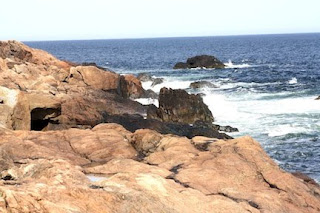


“Up in Massachusetts, there’s a little spit of land. The men who make the maps, they call the place Cape Ann. The men who do the fishing call it Gloucester Harbor Town. But the women left behind, they call the place Dogtown” – Harry Chapin.
Fishing and shipbuilding were the basic industries of the town and are still so to this day. It is the home of the Gorton’s Seafood company. And commercial fishermen leave the port on a daily basis.
Gloucester is a part of Cape Ann, which town boosters refer to as “the other cape” in Massachusetts. Like Cape Cod, which is on the other side of Massachusetts Bay, there is a lot of tourism there. And summer homes along it’s shores tend to be extraordinarily beautiful.
Anyhow, when I realized that Cape Ann was only a few hours away from where I was staying in Plymouth, I had to make a (don’t pardon the pun) pilgrimage there. I wanted to see the “endless rolling whispers of the waves,” “the silence of the granite and the screeching of the gulls” and what else inspired Chapin’s song. And as I toured Gloucester, I did my photography with the song in mind. Along the harbor are two statues, one of a widow looking out to sea and a better known one dedicated to fishermen lost at sea since colonial times. In fact, the monument also features a list of every person who never returned from a fishing expidition up to 2001.
My mind was sort of set on the “Dogtown” song. And there is a part of Cape Ann called Dogtown. It is a deserted village where widows and the poor went to but has no roads and is a nature preserve now. I drove there, but a roadblock combined with gunfire from a shooting range at the entrance ended any thoughts of exploring there. I had been warned a few times that people become lost in there. Dogtown is a reference to the fact that most sailors had dogs and they guarded the women left behind when they went out to sea.
I knew my mind was obsessed with the song that had been with me nearly four decades. And I was certain I was looking at the town through the eyes of the historian rather than the town of today. Yet I couldn’t help myself. But that changed with a drive from Gloucester to Rockport, another town along the cape. I followed a sign that described the upcoming road as the “scenic route” and it certainly is. Along the rocky coast, waves from the Atlantic Ocean explode as they crash headlong into the huge boulders. The color of the sea is an incredibly pure blue. And while I was there I realized that this was perhaps the most beautiful landscapes I had ever seen.
I went there with a friend, who had her own thoughts that were probably impossible to penetrate, though she tried. When she was married in the early 1970s, she and her husband spent a vacation there. And they returned there about a dozen years ago as her husband was weakened from the cancer that would take his life a few months later. I wondered how she compared her widowhood to the widows of the song.
But the incredible beauty of the land overwhelmed me. With every turn, I saw even more stunning scenes and my mind begged me to stop driving because it couldn’t take any more of the glorious views. I told my friend that if I never went to Heaven, I would have this place to remember because I could not comprehend how Heaven could be more beautiful.
